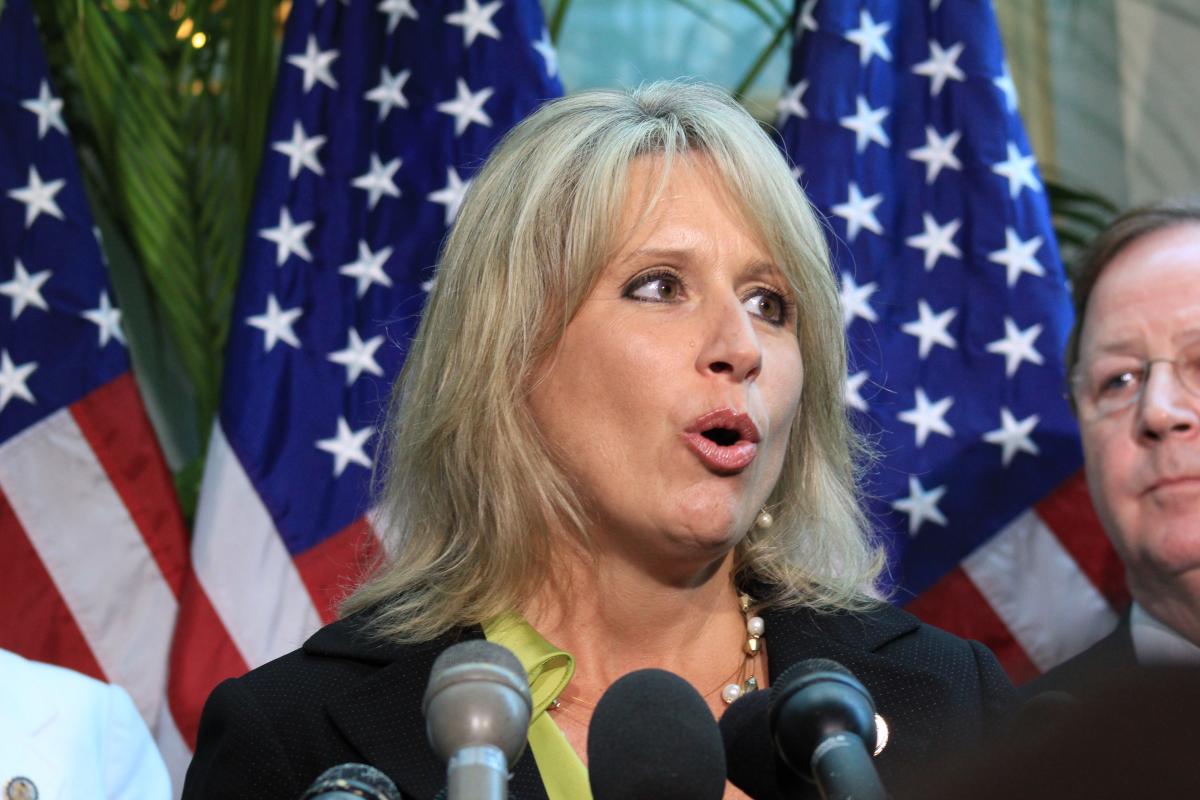Making its CPAC debut this year is the Constitution Party, which was originally organized in 1992 by right-wing activist Howard Phillips as the U.S. Taxpayers Party. Flyers being handed out at the group’s booth declare that it is the party of integrity, liberty and prosperity. According to the party, more than 75 of its candidates collectively earned over 1.3 million votes in 2016, and it was the first time the group’s presidential candidate got more than 200,000 votes.
The Constitution Party’s materials say that the party is needed because both “elitist-controlled major parties” have abandoned the principles of the nation’s founders. But one could argue that the group’s timing is a little off; its traditional values, states’ rights, anti-abortion, pro-gun, anti-immigration, pro-national-defense agenda is pretty hard to distinguish from the Republican Party in the era of Donald Trump.
Much of the Constitution Party’s 2016 platform sounds like the rhetoric heard from the Religious Right’s Christian-nation faction. Its preamble starts this way:
The Constitution Party gratefully acknowledges the blessing of our Lord and Savior Jesus Christ as Creator, Preserver and Ruler of the Universe and of these United States. We hereby appeal to Him for mercy, aid, comfort, guidance and the protection of His Providence as we work to restore and preserve these United States. This great nation was founded, not by religionists, but by Christians; not on religions but on a foundation of Christian principles and values. For this very reason peoples of all faiths have been and are afforded asylum, prosperity, and freedom of worship here. The goal of the Constitution Party is to restore American jurisprudence to its Biblical foundations and to limit the federal government to its Constitutional boundaries.
Another plank takes a hard-line position in opposition to abortion rights:
Roe v. Wade is an illegitimate usurpation of authority, contrary to the Declaration of Independence and Constitution. It must be resisted by all civil government officials, federal, state, and local, and by all branches of the government—legislative, executive and judicial.
And the group is dead-set in its opposition to equality for LGBTQ Americans, which might not go over with some of CPAC’s young, libertarian-leaning activists:
No government may legitimately authorize or define marriage or family relations contrary to what God has instituted. We are opposed to any judicial ruling or amending the U.S. Constitution or any state constitution re-defining marriage with any definition other than the Biblical standard … We reject the notion that homosexuals, transgenders or those who are sexually deviant are deserving of legal favor or special protection, and affirm the rights of states and localities to proscribe offensive sexual behavior. We oppose all efforts to impose a new sexual legal order through any courts or legislatures. … Finally, we oppose any legal recognition of homosexual or civil unions. … We affirm the value of the father and the mother in the home and we oppose efforts to legalize adoption of children by homosexual singles or couples.
On February 5, the Constitution Party’s Twitter account sent this tweet: “A question, and sometimes accusation, that we in the Constitution Party are often confronted with is whether the party wants to establish a theocracy. The answer to the question depends on whose definition of ‘theocracy’ you’re using.” That tweet linked to a blog post by Constitution Party member Robert Peck, which included a disclaimer that the post represented his personal views and not the official position of the party:
The word theocracy originates from the Greek θεοκρατία meaning, “the rule of God.” So, if you’re asking whether the Constitution Party wants our nation to be subject to the rule of God, then the answer is “yes.” As in the pledge of allegiance, we want to be one nation “under God,” not a nation out from under God, or a nation in rebellion against God, but a nation in submission under the Creator and His revealed will for the governing of the civil societies of His creation, which will includes the restraining of evil, preservation of the moral order, justice, and the protection of individual, God-given rights. …
In this regard, the Constitution Party most certainly does acknowledge the Creator God of the Bible and further acknowledges His rightful authority to prescribe the proper role of civil government and the just standards for the governance of the civil society.
But Peck says the Constitution Party opposes “the idea of the organized church directly running the institutions of civil government, or government passing laws that require specific religious practice or observance.”
One possible point of departure between the Constitution Party and the GOP and its Religious Right allies could be in the party’s insistence that the personal character of leaders is important, a position Religious Right leaders preached for decades before they embraced Trump. The platform decries the “lack of public outcry against immoral conduct by public office holders,” saying, “If they cannot be trusted in private life, neither can they be trusted in public life.”
Another potential area of difference could be in the group’s opposition to U.S. military involvement overseas. One flyer quotes former Reagan administration official Paul Craig Roberts decrying neo-conservatives as “essentially militarists committed to U.S. world hegemony.”
In 1996, Religious Right leader James Dobson reportedly cast a protest vote for Phillips, who was running as the then-Taxpayers Party candidates. Party leaders tried to get Roy Moore—the twice-ousted Chief Justice of Alabama—to run in 2004, and when he declined his longtime patron Michael Peroutka, a neo-confederate Christian Reconstructionist, stepped up to run. (Peroutka is now a Republican county official in Maryland.) In 2009, Rand Paul spoke to a gathering of the party’s Minnesota branch.
Journalist Adele Stan has called the party’s founder Howard Phillips a founding father of sorts to the Tea Party, noting that the party has over the years been home to right-wing activists like Operation Rescue founder Randall Terry and radical anti-abortion activist Matthew Trewhella. Party officials have been connected to the anti-choice “personhood” movement and to the Oath Keepers.









